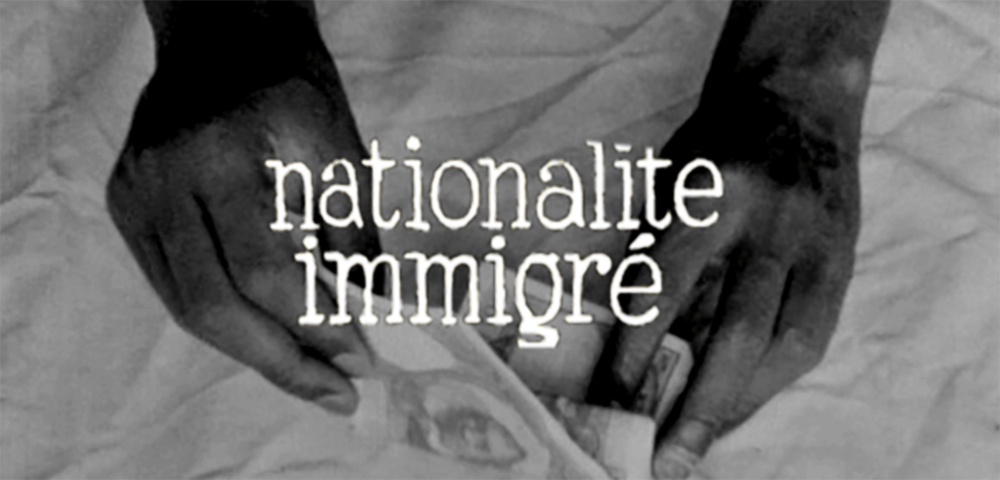
NATIONALITE: IMMIGRE
(NATIONALITY: IMMIGRANT)
Dir. Sidney Sokhona, 1975
France. 70 mins.
In French with English subtitles.
WEDNESDAY, MAY 8 – 7:30 PM + 10PM
ONE NIGHT ONLY
ALL PROCEEDS BENEFIT THE NEW YORK IMMIGRANT FREEDOM FUND
The New York Immigrant Freedom Fund is a program of the Brooklyn Community Bail Fund in partnership with an advisory board of community-based organizations fighting to dismantle our punitive immigration and detention systems. The advisory board consists of African Communities Together, Black Alliance for Just Immigration, Families for Freedom, Immigrant Defense Project, Make the Road New York, and the Surveillance Technology Oversight Project; other coalition partners include CAIR-NY.
Made by a young Parisian immigrant in his early 20s named Sidney Sokhona as he recoiled from a rash of exploitations and abuses in France’s African migrant community, NATIONALITÉ: IMMIGRÉ dramatizes the real-life rent strike undertaken by Sokhona and his neighbors in the Rue Riquet settlement housing, a “docu-fiction” of its own community in collaboration that’s unlike anything you’ve before seen in “world cinema”. One could hardly be blamed for interpreting the film as an endless litany of dehumanizing bureaucratic obstacle courses – as Serge Daney pointed out in his review “On Paper”, the film juts uncomfortably against the militant Left’s emphasis on using rupture theory to delegitimize the legal process, a high-minded option unavailable to immigrants like those depicted here. Sokhona took to filming after the Aubervilliers scandal of January 1970 – when five African migrants died in an overcrowded shelter on the periphery of Paris due to asphyxiation – prompting then-Prime Minister Jacques Chaban-Delmas to declare an end of these settlements, sometimes nicknamed bidonvilles or caves, by 1973. The filmmaker wasn’t so optimistic – but then, what NATIONALITÉ: IMMIGRÉ does offer is a rare glimpse at community organizing coming into praxis on both sides of the camera, with many of Sokhona’s neighbors playing themselves. (Sokhona financed the film in piecemeal fashion once scene at a time while working as a telephone operator.) While the thrust of NATIONALITÉ: IMMIGRÉ is unabashedly polemical, the loose narrative structure allows Sokhona to pursue fascinating side-stories and political tangents, at times dipping from what appears to be pure verite into a purely Brechtian exercise wherein immigrants are handed jobs in the form of huge placards, which they must carry around their necks, denoting their net worth to society in material terms.
In Cahiers du Cinema, Sokhona would elaborate to Daney and Jean-Pierre Oudart that “I was not sure that he who had loved NATIONALITÉ: IMMIGRÉ would like it – which does not mean that no one can love both. SAFRANA is, for me, the continuation of N:I. At the time it was done, compared to the reality of that time, there were a number of plans in the construction of the film itself on which we had to pass. For the first time, perhaps, people saw things they had never seen – so their membership was much simpler. I think people also ask: should a film about immigration be cinema? N.I. was in black and white, there was a certain desired poverty – it’s unthinkable to film an immigrant’s home in color…. People will go see a movie; of course they will see a subject, but it must be possible to express it in a very simple way. I think a political film – or engagé – can use other weapons, and touch a large number of people taking account of the movies.”
Assuming the position of both French and African filmmaker, Sokhona published a kind of manifesto in Cahiers du Cinema entitled “Notre Cinema” (Our Cinema), wherein he decried the cultural feedback loop enabled by state funding (especially in postcolonial cases), the incessant use of African landscapes as backdrops for tawdry Western melodramas, and the pigeonholing of black movies in festival programming – citing that the 1976 Cannes Film Festival included CAR WASH in its main slate, but consigned Ousmane Sembene’s CEDDO to competition in Directors’ Fortnight. If SAFRANA closes on an impossibly optimistic note for Sokhona (as the audience has, over the too-brief course of two movies, come to understand him), it reveals itself in hindsight as a byproduct of the French example, wherein the the organizing onscreen bears a utopian fruit that’s nevertheless untrustworthy. (Sokhona alleges that audiences were far more skeptical about the immigrants’ warm countryside reception in discussions following screenings in Paris.) What’s universalized in the humiliations of NATIONALITÉ: IMMIGRÉ remains – or as Sokhona put it to Cahiers, “Immigration has not only served to alienate us but also to teach us to be ashamed of what we were before. Any immigrant with a conscience realizes he has as much to claim on the workers’ side as the farmers’, today.”
~ screening with ~
